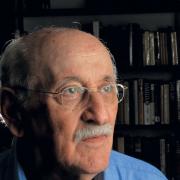History of the Department of Mathematical Physics
The history of DFMA has been marked by prominent figures in Brazilian Physics. The legacy of these researchers is a department that was, and continues to be, considered one of the best scientific research centers in Brazil.
Since its inception, DFMA has assumed the vocation of doing Basic Science in a broad sense: from the foundations of Quantum Mechanics to applications in Biology and Medicine; from Elementary Particle Physics to Cosmology and Astrophysics; from Mathematical Physics to Quantum Computing.
In addition to contributing at the highest level to the advancement of Science in Brazil, DFMA also has a long tradition of excellence in teaching Physics. Among the textbooks produced by DFMA professors are some of the best and most well-known texts in Brazil, such as Curso de Física Básica, by Moysés Nussenzveig. Several others were also awarded the Jabuti Prize, such as Thermodynamics, by Walter Wrezsinski, Quantum Mechanics, by Antônio Piza, Quantum Field Theory, by Marcelo Gomes, and Electrodynamics, by Josif Frenkel.
DFMA also stands out in the dissemination of Brazilian science, with books and colloquia of national and international scope, such as the Invitation to Physics.
The founding of the Department
The Department of Mathematical Physics (DFMA) was established in 1977 under the leadership of Prof. Hersch Moysés Nussenzveig, who had returned to Brazil after a long stay at the University of Rochester, USA, taking on the position of full professor at the Department of Nuclear Physics of the Physics Institute of the University of São Paulo.
The establishment of this new department restored the workspace of a group of seventeen theoretical physicists who, before the university reform of 1970, had been linked to different chairs in the former Physics Department of the School of Philosophy, Sciences and Letters of the University of São Paulo and survived the process of compulsory retirements triggered for political reasons at the end of 1968, which particularly affected Prof. Jayme Tiomno, whose name today identifies the seminar room of the DFMA. The areas of research activity of the members of the new department included Quantum Field Theory and Elementary Particle Physics, Mathematical Physics and Theoretical Nuclear Physics. Under the initial leadership of Prof. Nussenzveig, shortly after its founding, the department also had the distinguished long-term visit of Prof. Rudolph Peierls, who during his stay in São Paulo gave a series of lectures on his recently published book, Surprises in Theoretical Physics (Princeton University Press, 1979).

Prof. Hersch Moysés Nussenzveig
Concern for quality teaching
Initially, the DFMA was responsible for the undergraduate courses in Electromagnetism, Mathematical Physics, Quantum Mechanics, Introduction to the Theory of Elementary Particles and Fluid Mechanics, and for the postgraduate courses in Classical Electrodynamics, Quantum Mechanics and Quantum Field Theory, within the understanding, in force since the establishment of the Physics Institute, that their teaching should also be open to professors from other departments, taking into account their eventual interest, under the general administration of the Undergraduate and Postgraduate Committees. In view of this same understanding, in the years following its foundation, the DFMA played an important role in teaching basic Physics courses for the undergraduate course, still under the leadership of Prof. Nussenzveig, who at the time was writing the first two volumes of his Basic Physics Course for publication (Editora Edgard Blucher, 1981 and 1983).
In subsequent years, DFMA professors introduced new postgraduate courses to the Physics Institute on Functional Analysis, Quantum Mechanics and Stochastic Processes, Quantum Theory of Many Bodies, Cosmology and Gravitation, and Introduction to Quantum Computing Physics, with the purpose of providing interested students with the possibility of accessing, in a systematic and organized manner, results and techniques relevant to research in cutting-edge areas of theoretical physics. With regard to undergraduate courses, courses on the Physics of Stochastic Processes, General Relativity, and Computer Practices were introduced.
Physical and computing infrastructure
In addition to sufficient physical and secretarial infrastructure for theoretical work, the DFMA currently has an extensive and efficient Linux computing system that serves all of its faculty, postdoctoral fellows and graduate students.
The DFMA also contributes to the operation of a similar system in the Department of General Physics (DFG) and to computer rooms for use by undergraduate students. The current system represents a huge evolution, parallel to the growing importance of information technology in both research activities and teaching and administrative activities, since the installation of the first remote terminal at the DFMA, then directly connected to the university's Electronic Computing Center, around 1980.
Before the operationalization of the departmental system with greater coverage, an important computing resource used by DFMA faculty was that maintained at the Pelletron Laboratory of the Department of Nuclear Physics. Today, the DFMA and the DFG also have interconnected high-performance computing systems, designed locally, as a processing-intensive resource for research activities.
DFMA Research Areas
DFMA's current areas of activity are: Cosmology, Quantum Field and String Theory, Particle Physics, Mathematical Physics, Quantum Information and Relativistic Heavy Ions.
The Department's mission is to contribute to the development of these areas of scientific knowledge, in addition to maintaining, transmitting, permanently renewing, and making available the highest level of proficiency in them. This leads to familiarity with the best available descriptions of the basic aspects of how nature works.
The Intellectual Heritage maintained by the Department represents an indispensable resource for any scenario of sustainable scientific development, and its quality can be continuously assessed through contacts with researchers and similar groups on a global scale.

Prof. Hersch Moysés Nussenzveig

